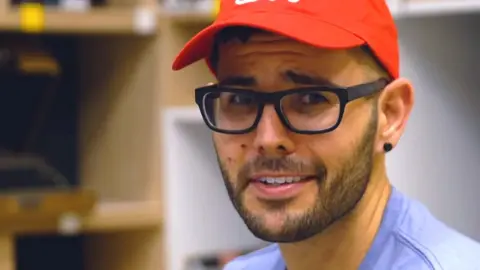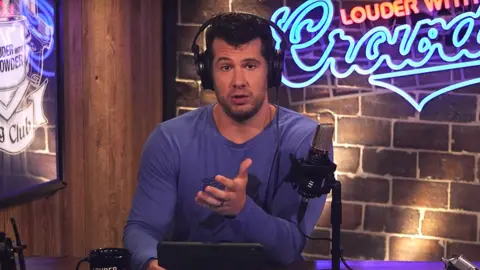YouTube's 'confused' response to anti-gay slurs
 Vox
VoxYouTube is one of many companies that has given its logo a rainbow-themed makeover to show support for LGBT rights - but, underneath the colourful veneer, a row has erupted over how the video-sharing site enforces its own hate-speech policies.
At the centre of the dispute is journalist Carlos Maza, who presents a popular series called Strikethrough for the news site Vox.
He says he has faced persistent abuse from rival video-maker Steven Crowder, who has more than 3.8 million subscribers on YouTube.
Whenever Maza publishes a video for Vox, Crowder will post his own "debunking" video, peppered with insulting language attacking Maza's sexual orientation and ethnicity.
So, last week, Maza posted a video compilation of the abuse.
In the clips, Crowder imitates Maza's accent and calls him, among other things, a "lispy queer", a "gay Vox sprite" and a "gay Mexican".
Maza asked YouTube to step in.
 Louder with Crowder
Louder with Crowder"These videos get millions of views on YouTube. Every time one gets posted, I wake up to a wall of homophobic/racist abuse on Instagram and Twitter," he said in a tweet.
"These videos make me a target of ridiculous harassment."
YouTube said it would investigate.
It conducted an "in-depth review" and on Tuesday it came back with an answer.
"While we found language that was clearly hurtful, the videos as posted don't violate our policies," it said in a statement.
However, after receiving further criticism, YouTube announced on Wednesday that it would demonetise Crowder's channel due to "continued egregious actions." This means he will no longer make money from advertising revenues on his videos.
But Maza said this was still not enough, pointing out that most political content is already demonetised and that Crowder would still be able to sell merchandise via his channel.
YouTube attempted to clarify its decision stating that Crowder would need to remove links to his t-shirts in order to reinstate monetisation of his channel.
It then reaffirmed that Crowder "would need to address all the issues with his channel" for monetisation to be reinstated, adding it was "sorry for the confusion."
'Friendly ribbing'
YouTube's response has been met with a mixed reaction.
Many people want to frame the dispute as a battle over free speech.
Crowder himself claimed the row was not about abuse but "an example of a giant corporate media entity [Vox] trying to silence voices they do not like".
He said the language he used to mock Maza was "friendly ribbing".
"It's funny and this is a comedy show. 'Lispy queer' is harmless and I enjoy saying it," he said in a video.
But others have said if YouTube itself accepted the videos were "hurtful", it was failing to enforce its own policies.
Its rules prohibit content that:
- is deliberately posted in order to humiliate someone
- makes hurtful and negative personal comments about another person
But YouTube said Crowder's comments did not violate the policies because they were sandwiched between "debate".
In notes provided by Google and published by news site Gizmodo, the company said: "We take into consideration whether criticism is focused primarily on debating the opinions expressed or is solely malicious."
YouTube's social media pages are currently decorated with rainbow-themed graphics, in support of LGBT rights.
But Maza said the video-sharing site was "exploiting" LGBT people.
"It's going to get so much worse now. YouTube has publicly stated that racist and homophobic abuse doesn't violate their anti-bullying policies," he said.

Analysis
by Ben Hunte, LGBT correspondent
Many professional LGBT video-makers will be familiar with uploading material online and instantly being tormented by certain audiences, solely because of their sexuality.
YouTube's take on this will disappoint the LGBT community.
It will surprise them that hurtful things considered hate speech and punishable by law in real life can simply be labelled "debate" online, and not require any repercussions.
With LGBT Pride Month just kicking off, it will be interesting to see how many other organisations will adopt rainbows across their brands, without necessarily backing the queer communities they are desperately marketing themselves to.

Updated policy
Unrelated to Mr Maza's dispute with Mr Crowder, YouTube published a blog on Wednesday saying it had updated its hate speech policy.
The changes include:
- explicitly banning videos alleging that one group is superior in order to justify discrimination, segregation or exclusion based on qualities such as age, gender, race, religion or sexual orientation
- an explicit ban on videos that "glorify Nazi ideology"
- removing content that "denies well-documented events" such as the Holocaust and Sandy Hook school shooting
- stopping channels that "repeatedly brush up against our hate speech policies" from earning advertising revenue
